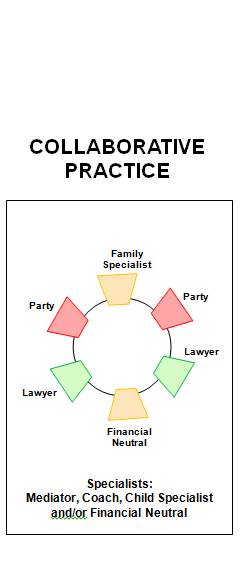Collaborative Practice is a way to create a settlement climate deliberately. This is done by removing the trial aspects from consideration. Collaborative lawyers agree to take cases, on a case by case basis, for settlement only.
The understanding is that if it is determined at any time that the parties cannot agree and settlement does not appear possible, or for any other reasons adversarial Court proceedings are likely to be required, the lawyers for both sides withdraw from the case and the parties would retain new lawyers from thereon out to final resolution.
Collaborative Practice is a way to resolve disputes without litigation. The parties and their collaborative team agree to negotiate in good faith to reach a mutually acceptable outcome with the threat of litigation removed by the agreement providing that the collaborative team must withdraw if the parties proceed to litigation. The use of the disqualification agreement is a defining principal of Collaborative Practice and ensures that parties can engage in good faith, interest based negotiation without fear of ever facing their former partner’s lawyer in a court room.
Collaborative Practice enables issues and solutions not limited to the Family Law Act options to be considered.
The facilitative mediation skill of interest based negotiation are used in Collaborative Practice to achieve a mutually acceptable outcome. Collaborative practitioners should have interest based conflict resolution training of the kind typically taught in mediation training.
Collaborative Practice enables the needs and interests of both the parties and their children to be addressed. Collaborative lawyers often work with Collaboratively trained family relationship consultants and financial specialists to help clients address the interests and concerns. The multidisciplinary model also often uses neutral financial specialists such as financial planners and accountants to gather and organise financial information and use their neutrality to provide financial advice and analysis for the parties in an impartial way. A key role of all Collaborative Professionals is to be an educator for the parties.
Collaborative practitioners often comment upon the liberating effect of working with both the parties and the Collaborative team in good faith and in open and honest dealings working towards a solution of a problem that meets the needs of the parties. Unlike litigation the process is directed solely towards problem solving rather than building a case to present to a court to defeat the other party. In litigation the focus is often to pursue perceived rights of one party with little or no consideration of the rights of the other party and the long term effects on each party. In Collaborative Practice when harm is seen the team can assist the parties to remove the cause of harm.
Whilst parties meet with their lawyers and the neutral specialist the work of sharing goals, interests and concerns is done in joint meetings and not by positional correspondence from lawyers.
Collaborative lawyers are advocates for their client’s interests. Advocacy does not mean adversarial. Collaborative lawyers work as a team to help their clients find mutually satisfactory agreement and provide their clients whatever support is needed to ensure that their client has a safe, effective negotiation environment.
Collaborative Practice is appropriate for a wide range of clients who want to resolve their issues out of Court but still want legal advice and support in negotiating an agreement. The use of a Collaborative team of financial and family relationship consultants can also assist couples who have low trust, high conflict and serious limitations in their capacity to communicate, complex issues or imbalance in understanding of their finances. In these challenging situations, a full multi-disciplinary team can achieve far greater outcomes than a lawyer only model.

